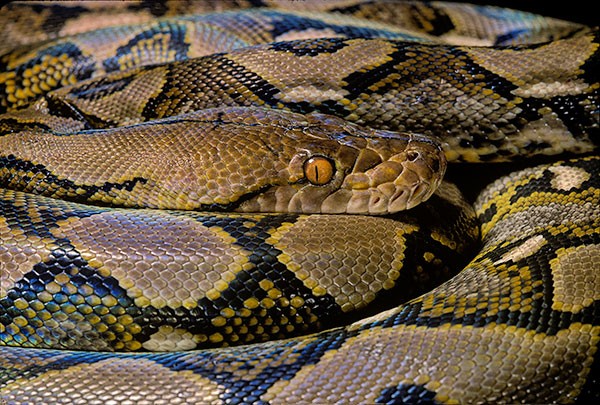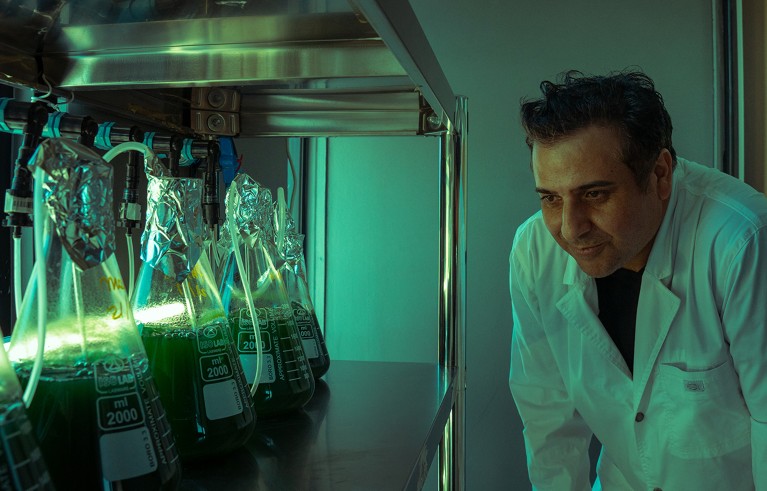Hello Nature readers, would you like to get this Briefing in your inbox free every day? Sign up here.

Farmed reticulated pythons grow quickly when being fed trapped rodents or waste protein from other meat-producing industries (Paul Starosta/Getty).
Snake meat could help feed the world
Large pythons are better at converting their food into edible protein than many other farmed animals, including chickens, pigs, cows, salmon and crickets. Reticulated pythons (Malayopython reticulatus) and Burmese pythons (Python bivittatus) on farms could fast for months without losing much weight, which could help to ensure food security during economic or climatic disruptions, says herpetologist and study co-author Dan Natusch. “Farming pythons could be a big part of the solution for a part of the world that is already suffering from severe protein deficiency.” Python farming is well established in Asia and the meat is “pretty tasty and versatile”, Natusch adds. Detailed analyses of python farms’ environmental impact and of the meat’s nutritional content are now needed, says food systems scientist Monika Zurek.
Scientific American | 5 min read
Reference: Scientific Reports paper
How to stop ‘passing the harasser’
A think tank is urging UK universities to share information on misconduct investigations to make it more difficult for sexual harassers to hide their past. A 2018 review of more than 300 sexual misconduct cases in US academia found that more than half of the perpetrators were serial harassers, who often relocated to different institutions and repeated the same pattern of misconduct. Supporters of the Misconduct Disclosure Scheme point out that it has already proved its worth in the humanitarian sector.
Virus helped brain evolution
Remnants of an ancient viral infection are essential for producing myelin, a protein that insulates nerve fibres, in most vertebrates. Certain viruses insert DNA into the genetic material of the cells they invade. Sometimes, these insertions become permanent and even aid evolutionary processes. Myelin helps nerves to send electrical signals faster, grow longer and thinner so they can be packed in more efficiently. “As a result of myelin, brains became more complex and vertebrates became more diverse,” says stem-cell biologist and study co-author Robin Franklin.
Features & opinion
The scientists battling long COVID
Researchers living with long COVID say they have been mostly left to fend for themselves or to navigate workplace accommodation policies that aren’t tailored for them. “It felt like they threw everything at me to advocate for myself,” says one social scientist. Some long-haulers have found ways to manage their symptoms, which can include cognitive impairment and fatigue, whereas others rely on compassionate supervisors. Some advocates are calling for a culture shift in which “every person would feel like they can ask for what they need and be supported in that request, even if, ultimately, they don’t get exactly what they want”, says Emily Shryock, director of the University of Texas at Austin’s Disability Cultural Center.
What type of collaborator are you?
Are you a diva, captain, ghost, ant or bumble bee? Clinical psychologist Olga Lehmann invented these ‘personas’ to help her reflect on a difficult collaboration. She recommends creating a team agreement that lays out general rules of behaviour among co-authors before starting work on a grant proposal or paper. Her hard-won advice: schedule regular check-in meetings, plan for conflict and show empathy to others — but have an exit strategy if things get personal.
Why research needs to move beyond sex
“If we want to aim for precision, we need to go further than relying on proxies,” says sociologist Madeleine Pape, who is part of an interdisciplinary group of researchers advocating for more complex ways of studying sex-related variation. They say that using the category ‘women’ as a proxy for the presence of a uterus can underestimate, for example, the incidence of uterine cancer. “Women aren’t a one-size-fits-all,” Pape says. “Variation is worth understanding and worth engaging with if we want to actually address gender disparities in health.”
Reference: Cell perspective
Where I work

Gabriel Renato Castro is the founder and chief executive of Spiral Blue Food Spa in Chincolco, Chile.Credit: Karl Mancini/Pulitzer Centre
Marine biologist Gabriel Renato Castro is growing microorganisms such as cyanobacteria to make fertilizers, pesticides and other agricultural products that help crops survive droughts, pests and a lack of arable soil. “To understand the macrouniverse, we need to understand the microuniverse,” he says. “My ultimate goal is to share my knowledge with local community members in Chile, so they can develop more resilient and sustainable agricultural practices.” (Nature | 3 min read)
